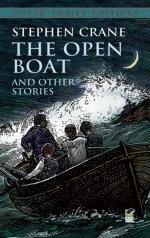|
This section contains 1,943 words (approx. 7 pages at 300 words per page) |

|
Realization in "the Open Boat"
Summary: Discusses the short story "The Open Boat," by Stephen Crane. Describes how Crane uses imagery, personification, and symbolism to illustrate Nature's obliviousness to the fortunes of men and to reveal the struggles of man's realization and acceptance of this reality.
"The Open Boat" by Stephen Crane is a factual account of his adventures at sea, or as he declares, "the Experience of Four Men from the Sunk Steamer COMMODORE" (48). He and three other men--the ship's captain, oiler, and cook--escape the sinking steamer in a small dinghy, and spend thirty wretched hours on the rough sea before reaching the Florida coast. Despite undergoing these events firsthand, Crane narrates the story in third person, indicating his presence in the dinghy through the character of the correspondent. As time passes during their perils at sea, Crane, or the correspondent, creeps ever closer to an impending epiphany: the realization of the indifference of nature and the relative insignificance of men--essentially, Crane's personal beliefs, as well as the presiding themes of Naturalism, which is "an irreligious philosophy that views the universe as indifferent to the existence and struggles of humans" (48). Through the use...
|
This section contains 1,943 words (approx. 7 pages at 300 words per page) |

|


